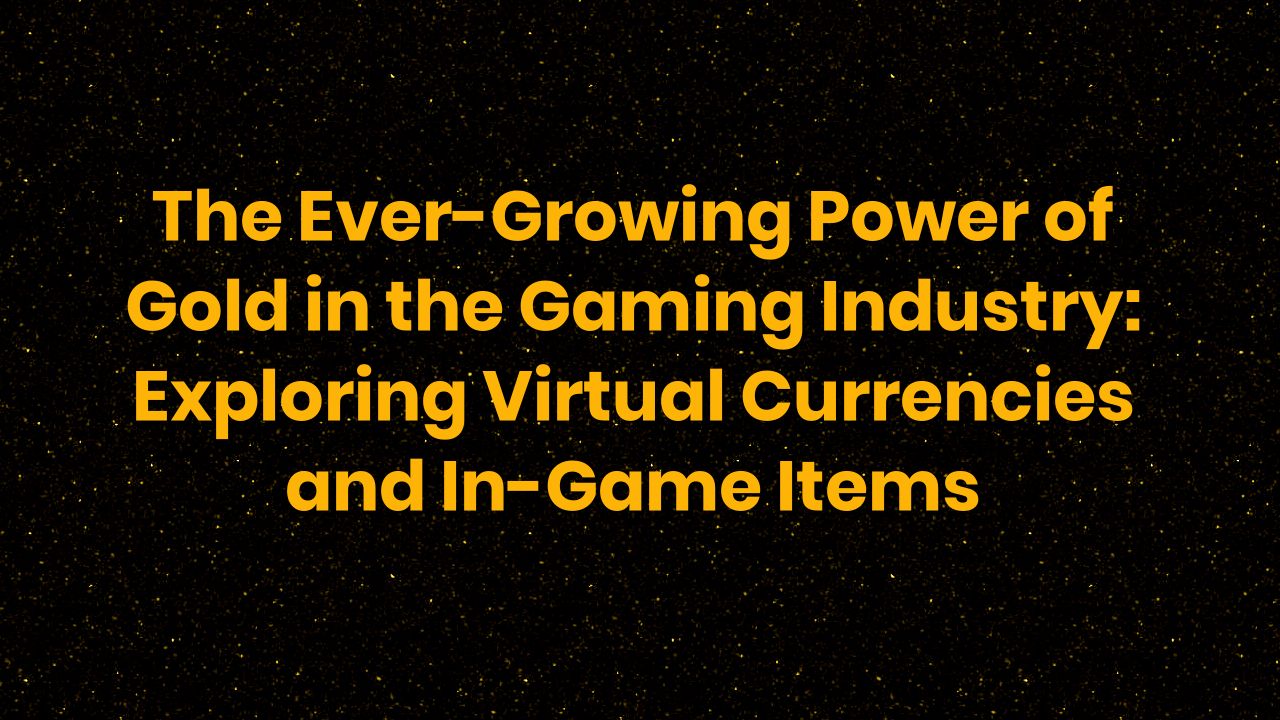
Table of Contents
Introduction
The world of gaming has undergone a radical transformation in recent years, with the rise of virtual currencies and in-game items forever changing the landscape of the industry. In-game virtual currencies, including gems, coins, loot boxes and other digital currencies, are becoming increasingly popular across the gaming industry. The ability to buy virtual items for real money has opened up new revenue streams for game developers, as players look to enhance their gaming experience with exclusive virtual items. At the forefront of this revolution lies gold – a universal currency that has been a key element in gaming since the dawn of RPGs. In this blog, we will explore the growing power of gold in the gaming industry, and the ways in which virtual currencies and in-game items are transforming the way we play games.
The Rise of Virtual Currencies in Gaming
Virtual currencies, or in-game currencies, have become increasingly popular in the gaming industry for several reasons. Firstly, they offer a way of monetizing free-to-play games, which can be enjoyed without paying anything initially. Secondly, virtual currencies allow for a more immersive and engaging gaming experience, as players can use their currency to purchase exclusive in-game items, enhance their characters, or unlock bonuses. Lastly, virtual currencies provide a safe and secure means of conducting transactions within games, preventing fraud and minimizing risks associated with in-game trading. Some of the most popular virtual currencies in gaming today include WoW Gold, GTA Online Cash and League of Legends Riot Points.
The Benefits of In-Game Items and Microtransactions
Microtransactions are the latest trend in gaming, with players now incentivized to purchase in-game items with real money. While microtransactions have been criticized by some as being exploitative, they offer several benefits to both game developers and gamers alike. For game developers, microtransactions offer a steady stream of revenue, even after the game has been sold or given away for free. In fact, in-game purchases have become a crucial source of revenue for many game developers, with some generating millions of dollars in revenue every year. For gamers, in-game items offer a way to personalize and enhance their gaming experience, giving them a sense of exclusivity and ownership. Additionally, in-game items can provide a competitive edge, especially in the realm of multiplayer online gaming.
The Role of Gold as a Universal Currency
Gold has long been a universal currency in gaming, providing a means of exchange between players and allowing for the purchase of exclusive in-game items, services and upgrades. Unlike other virtual currencies, gold can be traded directly between players, giving it a real-world value that few other currencies can match. Additionally, gold can be accumulated over time, making it an ideal currency for gamers who want to build up their wealth gradually. Despite its many benefits, gold does have some drawbacks, including the potential for fraud and scams that can occur in the murky world of gold trading.
Gold in Multiplayer Online Games
Multiplayer online games, or MOGs, have become some of the most popular games in the world. In MOGs, gold is often used as a means of exchange between players, allowing for trades, auctions and purchases of in-game items. For many players, accumulating gold has become a crucial part of the gaming experience, offering an additional reward for time and effort invested in the game. Additionally, gold can provide players with a sense of status, as accumulating large amounts of gold often indicates a player’s skill and ability within the game.
Gold Farming and its Controversies
Gold farming, the act of accumulating gold in gaming for profit, has become a controversial topic in the gaming industry. While many players use gold farming as a way of boosting their own in-game wealth and status, others see it as a form of cheating or exploitation. From developers’ perspectives, gold farming can also pose a threat to the in-game economy, leading to inflation and market manipulation. Despite these issues, gold farming remains a lucrative business, with many players earning large amounts of money through in-game currency sales.
The Future of Gold in Gaming
As the gaming industry continues to evolve, the role of gold is likely to change as well. With the advent of new technologies such as blockchain and virtual reality, gold may become even more valuable in the years to come, offering gamers new opportunities for trade and investment. Additionally, as more and more gamers turn to multiplayer online games, gold is likely to become increasingly important as a means of trade and exchange between players.
Summary and Conclusion
In conclusion, gold plays a crucial role in the gaming industry, offering a universal currency that allows for safe and secure transactions between players. Virtual currencies and in-game items have forever changed the gaming landscape, allowing for new revenue streams and a more immersive gaming experience. While challenges such as gold farming and currency scams remain, the potential benefits of gold in gaming are significant, and are likely to continue to shape the industry for many years to come.





